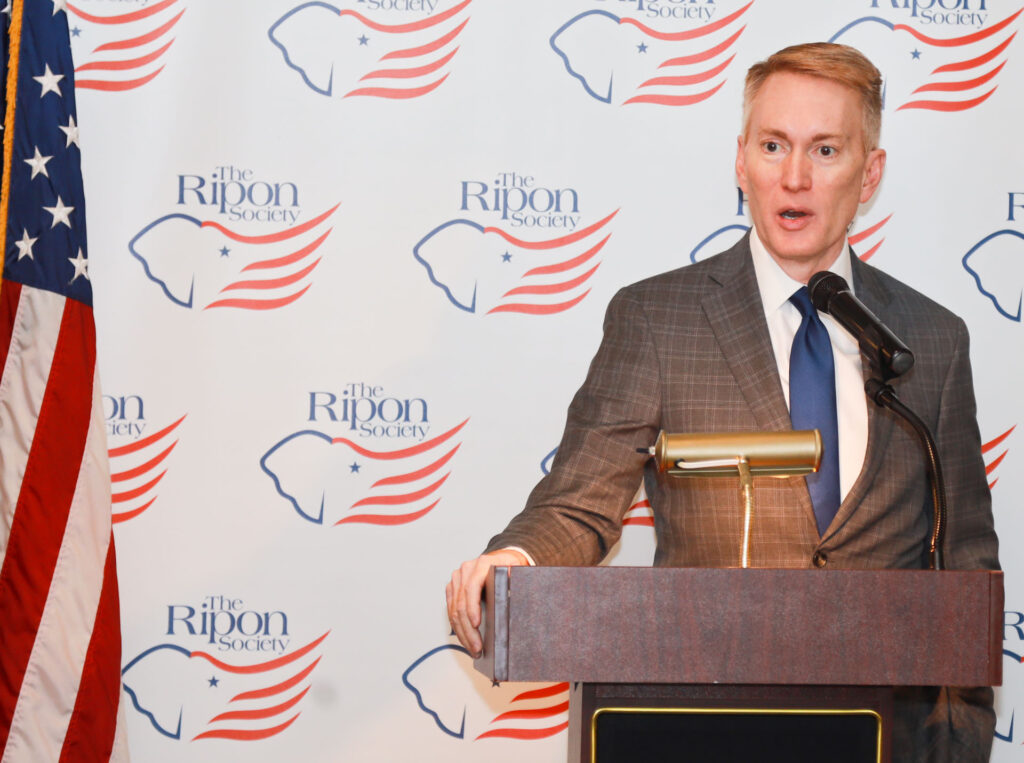“We’ve had more than 10,000 individuals come across in the last four months who are listed as a national security risk.”

WASHINGTON, DC – In remarks yesterday morning before a breakfast meeting of The Ripon Society, U.S. Sen. James Lankford (R-OK) talked about the ongoing crisis along America’s southern border, and how this crisis has exploded in recent years to become a threat to our national security.
“In the last four and a half months alone,” the Oklahoma lawmaker stated, “we’ve had more than 50 people picked up who are on our terror watch list. If I go back just a few years ago, we would’ve had just three picked up in a whole year. We’ve had more than 10,000 individuals come across in the last four months who are listed as a national security risk.”
“They’re not on our terror watch list. But they come from a family, a tribe, a community, or a clan that is connected with terrorism. Of those 10,000, the vast majority of them were released into the country. They’re somewhere in the United States right now.”
And that, Lankford said, represents perhaps the biggest change in the border security debate these days – the fact that America has thousands of individuals from all over the world who are identified as “national security risks,” who crossed our border illegally, and who are now spread out across the country, nowhere to be found.
It is a change, he added, that most Americans are not aware of.
“When I talk to people about what’s happening on the border,” Lankford observed, “there are some people who address it as if it were five years ago, where we had between 4,000 and 4,500 illegally crossing the border on peak days during the Trump administration in 2019.
“But the vast majority of those individuals were Spanish-speaking individuals coming from the Western Hemisphere. Today, we have days where more than half of the people coming in are not from the Western Hemisphere. They’re coming from Russia. They’re coming from China. They’re coming from Pakistan. They’re coming from West Africa. They’re coming from the Middle East. They’re coming from all over the place.
“They are individuals coming into our country who we have no facts or information about. We have no criminal background check to verify what happened in their country or what their behavior was in their country before they came here.”
To address this crisis, Lankford has spent the better part of the past four months developing a bipartisan plan to strengthen security along the southern border.
Among other things, the plan would:
- Change America’s border policy from catch and release to detain and deport;
- Provide funding to build the wall, increase technology at the border, and add more detention beds, more agents, and more deportation flights; and,
- End the abuse of parole on America’s southwest border and reform the nation’s asylum laws by conducting fast screenings with a higher standard of evidence, limited appeals, and faster deportation.
Perhaps just as significantly, Lankford added, the plan provides no amnesty for those who cross the border illegally.
“It’s the first time a bipartisan negotiation came back without amnesty being attached to it,” he said, “because the focus really was on border security. And the main focus is how do we clarify asylum? We have thousands of people coming across. Some of them actually do qualify for asylum. But it’s not very many. So how do we find the individuals who really do qualify for asylum, process them in a faster way, and take everyone else and turn them around?”
Lankford concluded his remarks by talking about the other pressing challenges facing America in addition to border security, and why it is critical that Republicans and Democrats put politics aside and come together to address these challenges in a bipartisan way.
“We have to sit down, come to agreement, and figure out how we’re going to solve problems,” he stated, “because there’s another problem right behind it. And as I’ve said to my colleagues, this is the easiest of the hard things. We have the debt to deal with. We have Social Security to deal with. We have Medicare to deal with. We have harder things than this. If we can’t do the easiest of the hard things, we’re in a difficult spot.
“Leaders were elected to do hard things. So let’s do hard things. That’s what we’re supposed to do, even when it takes a long time.”
Following his opening remarks, Lankford was asked a number of questions, including one about the differences of opinion that exist within the Republican Party on the issue of border security and the prospects that an agreement can be reached in the coming weeks.
“The challenge we have right now is an activist base that says, ‘I want everything, or I want nothing,’” Lankford stated matter-of-factly. “That does not align with the many people across the country who are saying, ‘These are hard problems. Do something. Don’t just stand there.’”
“I don’t know how this gets better until we as Republicans decide we’re going to solve problems. Right now, we’re attacking the people attacking the problem. And that’s not healthy for us.”
To view Lankford’s remarks before The Ripon Society yesterday morning, please click the link below:
The Ripon Society is a public policy organization that was founded in 1962 and takes its name from the town where the Republican Party was born in 1854 – Ripon, Wisconsin. One of the main goals of The Ripon Society is to promote the ideas and principles that have made America great and contributed to the GOP’s success. These ideas include keeping our nation secure, keeping taxes low and having a federal government that is smaller, smarter and more accountable to the people.
For more information on The Ripon Society, please visit www.clu.ccw.mybluehost.me.



